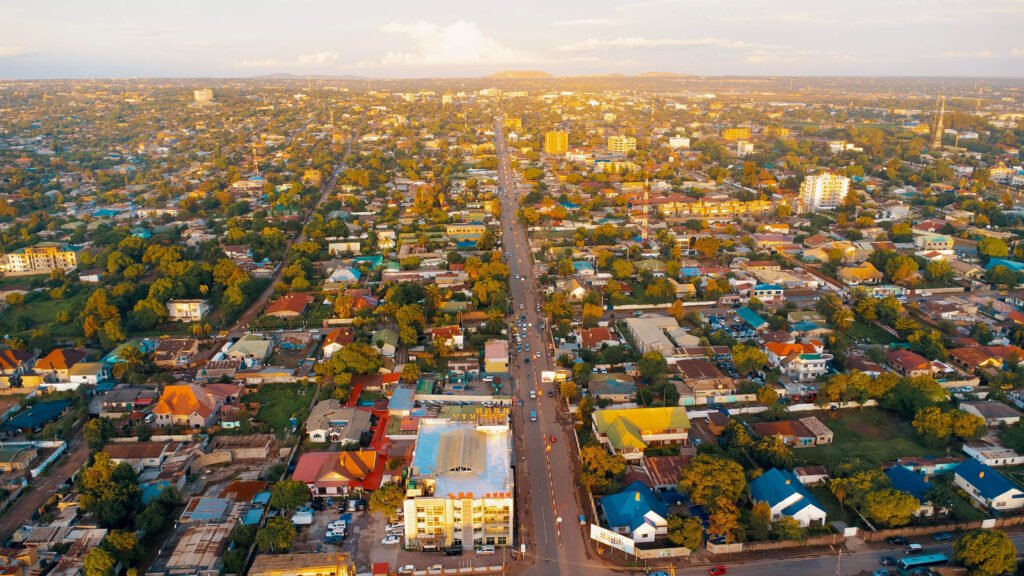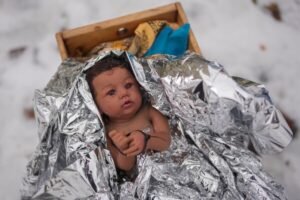Tragedy in the DRC: The Beheading of 70 Christians in a Church Attack

City of lubumbashi, democratic republic of the congo, day
Introduction to the Incident
The recent tragedy that unfolded in the Democratic Republic of the Congo (DRC) has sent shockwaves through both the local community and the global landscape. In a heartbreaking incident, 70 Christians were brutally beheaded within the confines of their place of worship, a church which should have represented safety and solace. This heinous act raises numerous questions concerning the motives behind such brutality, highlighting the ongoing violence that has plagued the region.
Background on the DRC’s Religious Landscape
The Democratic Republic of the Congo (DRC) boasts a rich tapestry of religious beliefs and traditions, shaped by its complex history and diverse population. Predominantly Christian, the DRC is home to approximately 95% of believers, with Catholicism and Protestantism being the largest denominations. The Catholic Church has a significant historical presence, dating back to the colonial era, while a multitude of Protestant denominations, including Baptist, Pentecostal, and Anglican communities, have flourished since the late 19th century. The influence of these faith communities extends beyond spiritual guidance, often intersecting with social and political spheres, reflecting the deep historical roots of religion in the region.
However, this vibrant religious landscape has not been without challenges. The DRC has faced ongoing tensions between various faith groups, exacerbated by tribal affiliations and ethnic diversity. These tensions occasionally manifest in violence, particularly in eastern regions where armed conflicts are more prevalent. The rise of extremist groups targeting Christians and other religious minorities has contributed to a climate of fear, where believers are often subjected to persecution. The recent tragic beheading of 70 Christians during a church attack underscores these alarming trends, revealing the precarious situation faced by congregations across the nation.
Moreover, the political landscape further complicates the religious situation, as state institutions often struggle to uphold religious freedoms amidst widespread corruption and instability. Individuals and communities advocating for their rights face significant risks, leading many to question the ability of the government to protect its citizens. In light of this backdrop, understanding the religious dynamic of the DRC is essential for grasping the factors contributing to such tragic occurrences, which not only impact the Christian population but also reflect deeper societal fractures in the nation.
Details of the Church Attack
On March 28, 2023, a horrific incident unfolded at a church in the Ituri Province of the Democratic Republic of the Congo (DRC), where armed assailants launched a brutal attack leading to the beheading of at least 70 Christians. The attack took place during a Sunday service, a time typically associated with peace and reflection, which heightened the shock and horror among the local community. Witnesses reported that several masked men, suspected to be members of the Allied Democratic Forces (ADF), stormed the church, wielding machetes and firearms, creating a scene of chaos and terror.
Eyewitness accounts describe the overwhelming panic as worshippers attempted to flee the building, clinging to their lives amidst the chaos. Survivor testimonies reveal a harrowing picture of the events that transpired. One survivor recounted the horrifying moments when the attackers shouted threats while brandishing their weapons, indiscriminately targeting individuals within the congregation. The emotional toll on these survivors is evident, as many are left grappling with trauma while mourning the loss of their family and friends.
Community leaders have condemned the attack, calling for swift action against the perpetrators while emphasizing the urgent need for protection for religious congregations in volatile regions of the DRC. The ADF, a group with a history of violence, has been linked to numerous atrocities in the area. Their presence represents a long-standing threat to the safety of local communities, inciting fear and despair among citizens. As the DRC grapples with findings surrounding this attack, it brings to light the broader issues of insecurity and ongoing violence that plague the nation, underscoring the urgent call for peace and stability in the region.
Reactions from the Community and Leaders
The tragic beheading of 70 Christians during a recent church attack in the Democratic Republic of the Congo (DRC) has sparked widespread outrage and grief across various segments of society. Local leaders, including church dignitaries and political figures, have condemned the violent act, calling it a brutal assault not only on individuals but on the very fabric of the community. Bishop Emmanuel Mumba of the local diocese issued a poignant statement expressing sorrow and solidarity with the victims’ families. He emphasized the need for unity and resilience in the face of such senseless violence.
Moreover, international and regional faith-based organizations have also responded swiftly to the horrifying event. Many organizations, such as the World Council of Churches, have condemned the killings as egregious human rights violations. Their spokespeople highlighted the importance of protecting religious freedoms and ensuring that faith-based communities can worship without fear of persecution. This sentiment has resonated deeply within the local populace, who are grappling with the emotional aftermath of the attack.
Community members are voicing their grief, anger, and fear through various platforms, from social media to public gatherings. Many are seeking solace and support through communal prayers and vigils, marking a moment of mourning and reflection. This collective response serves as a testament to the strength and resilience of the DRC’s communities, even in the wake of devastating violence. Additionally, local governments are urged to increase security measures to prevent such tragedies from recurring, indicating a need for urgent reform and accountability within the region’s security forces.
As the community processes the tragedy, the longing for justice remains paramount. The calls for investigations into the attacks and assurance of safety reflect a widespread desire for change and protection against violence targeting faith-based communities.
International Condemnation and Response
The tragic beheading of 70 Christians in a recent church attack in the Democratic Republic of the Congo (DRC) has elicited strong international condemnation and expressions of solidarity with the victims’ families and communities. Governments and leaders worldwide have voiced their outrage at this heinous act, each emphasizing the need for justice and accountability in the ongoing struggle against religious persecution. For instance, prominent officials from various countries, including the United States, Canada, and members of the European Union, have issued statements condemning the violence and calling for enhanced security measures to protect vulnerable religious groups in the DRC.
Non-governmental organizations (NGOs) have also played a crucial role in responding to this horrific event. They have highlighted the urgent need to address the systemic issues that contribute to such violence against Christians and other religious minorities in the region. Organizations such as Amnesty International and Human Rights Watch have launched campaigns advocating for the protection of human rights and the prevention of future attacks. These NGOs are urging the Congolese government to take decisive action against armed groups perpetrating this violence, emphasizing that religious freedom is a fundamental human right that must be upheld.
Religious bodies across the globe have expressed their sorrow and support for the affected communities. Many faith leaders have called for prayers and solidarity, raising awareness about the increasing violence against Christians in the DRC. They have underscored the need for dialogue and reconciliation among different religious groups to cultivate an environment of peace and coexistence. The collective international response has brought attention to the plight of Christians in the DRC, with many advocating for sustainable solutions that ensure freedom of worship and protection against violent extremism.
Historical Violence Against Christians in the DRC
The Democratic Republic of the Congo (DRC) has a long and tumultuous history marked by violence and conflict, disproportionately affecting its Christian population. Since gaining independence in 1960, the DRC has experienced numerous episodes of violence, often linked to political instability and a persistent power struggle among various factions. This multifaceted conflict has resulted in repeated assaults on religious communities, particularly targeting Christians who frequently advocate for peace and societal cohesion.
One of the earlier notable incidents occurred during the late 1990s when the First Congo War erupted, leading to widespread atrocities against civilians, including Christians. Armed groups exploited the chaos to commit human rights violations, which continued into the subsequent Second Congo War. These conflicts have been fueled by external influences, including foreign intervention and the illegal exploitation of natural resources, further complicating the socio-political landscape. Such instability creates an environment conducive to religious persecution, where Christians are often caught in the crossfire of armed groups seeking control and dominance.
Additionally, socioeconomic challenges exacerbate these tensions. A significant portion of the DRC’s population lives in poverty, lacking access to education and basic healthcare. This economic vulnerability renders Christian communities particularly susceptible to manipulation by extremist groups, which can sway vulnerable individuals to adopt radical ideologies. Attacks on churches and congregations not only demonstrate a blatant disregard for human life but also underline the systemic issues surrounding governance and security in the region.
The climate of fear and persecution has led to increased migration as Christians seek safety and security outside the DRC. As these incidents of violence continue, the need for both domestic and international attention becomes essential in addressing the underlying issues fueling this cycle of persecution and ensuring the protection of Christians in the DRC.
The Role of the Government and Military
The tragic beheading of 70 Christians during an attack on a church in the Democratic Republic of the Congo (DRC) has raised significant concerns regarding the effectiveness of the government and military forces in addressing violence against religious communities. In the wake of such heinous acts, the response of the DRC government becomes crucial. The military’s engagement in protecting vulnerable populations, particularly Christians facing targeted violence, has been a focal point of national and international scrutiny.
Historically, the DRC has faced numerous challenges related to national security, necessitating substantial military intervention to restore peace. However, the effectiveness of these military forces has often been called into question due to resource limitations and lack of adequate training. The government’s response to the church attack highlights the ongoing struggle against militia groups that perpetrate violence against marginalized communities. Critically, the allocation of military resources and strategic planning is essential for addressing such threats effectively.
In recent years, the government has implemented various initiatives aimed at strengthening the military capacity and providing better protection for vulnerable communities. Collaboration with international partners for training and resource provision has shown promise, yet the execution of such policies often falters amidst corruption and bureaucratic inefficiencies. Additionally, the timing and quality of military response during the attack have faced severe criticism from both citizens and advocacy groups who argue that more proactive measures could have prevented the tragic loss of life.
Despite government efforts to placate tensions and enhance security in conflict-prone areas, the overall impact remains insufficient in preventing such brutal acts of violence. This situation underscores the need for an urgent reassessment of the strategies employed by the DRC government and military. Ensuring the safety and protection of Christians and other vulnerable groups requires a comprehensive approach that addresses the root causes of violence alongside prompt and effective military action.
Hope and Resilience: Stories of Survival
In the face of unimaginable tragedy, stories of hope and resilience have emerged from the depths of despair in the Democratic Republic of the Congo (DRC). Among the survivors of the church attack are individuals who display profound strength, showcasing their ability to endure and inspire those around them. These remarkable narratives not only highlight personal survival but also shed light on the collective spirit of a community determined to rise above the unimaginable violence they have endured.
One survivor, a local pastor, recounts how despite witnessing the horrific events, his faith was rekindled in unexpected ways. Instead of succumbing to despair, he organized prayer vigils and counseling sessions for the affected families, promoting healing and unity within the community. His actions have not only provided solace but have also reinforced the church’s commitment to nurturing faith even amidst adversity. Stories like these serve as beacons of hope for others grappling with their loss.
Community support initiatives have played a pivotal role in helping those affected rebuild their lives. Local nonprofit organizations have mobilized volunteers to assist grieving families, offering resources such as counseling, food, and temporary housing. These efforts are integral in fostering a sense of belonging and stability in a time of turmoil. Community members have expressed their gratitude for the outpouring of support, echoing a sentiment that solidarity is a crucial stepping stone toward recovery.
The local Christian community has demonstrated incredible resilience, finding strength in shared beliefs and collective mourning. By continuing to worship and gather for prayer despite the tragedy, they send a powerful message: their faith will not be shaken. This perseverance not only honors the memories of those lost but also reflects a commitment to maintaining their spiritual and communal identity in the wake of tragedy. These stories of survival and the spirit of community remain a testament to the indomitable human spirit in the DRC.
Conclusion: A Call for Action and Awareness
The tragic beheading of 70 Christians in a church attack in the Democratic Republic of the Congo is a stark reminder of the extreme levels of violence that religious communities can face. This horrific event not only highlights the perils that Christians endure in the DRC but also draws attention to broader issues of religious persecution and violence across the globe. As we reflect on the consequences of such brutality, it is crucial to recognize the need for collective action to address these ongoing threats to religious communities.
In light of these recent events, individuals and organizations must step up and advocate for the protection of religious minorities who are subjected to violence and discrimination. It is essential to voice support for stronger international policies and interventions aimed at safeguarding human rights and promoting religious freedom. By raising awareness about the plight of persecuted Christians in the DRC and beyond, we can help increase pressure on governing bodies and organizations to take necessary actions against such atrocities.
Moreover, fostering dialogue among different faiths and encouraging interfaith partnerships can be instrumental in combatting religious violence. Understanding and respecting diverse beliefs create pathways to peace, thereby diminishing the potential for conflict. Communities globally must unite in their commitment to advocate for victims of religious persecution and to promote strategies that reduce violence and foster tolerance.
As the world grapples with the horrors faced by Christians in the Democratic Republic of the Congo, it serves as a call to all of us to take meaningful action. By educating ourselves and others, mobilizing resources, and advocating for change, we stand a better chance at addressing the systemic issues leading to such tragic events. The responsibility lies with each of us to create a safer and more just world for everyone, regardless of their faith.










